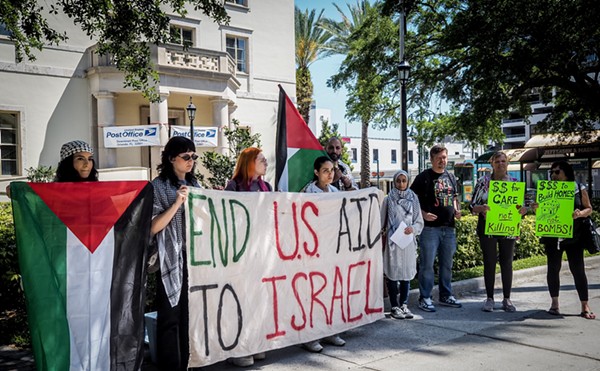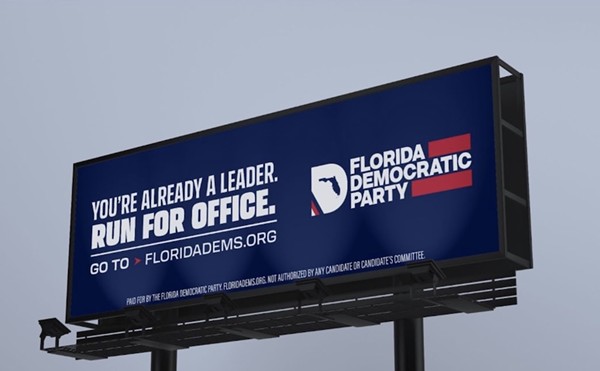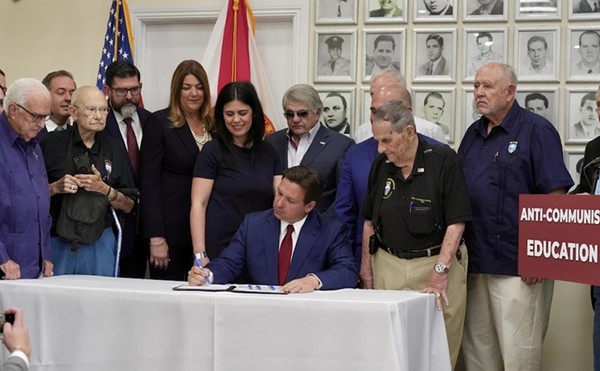;On Dec. 11, the news came that the TD Waterhouse Centre was to become, under a $1.5 million naming rights deal, the Amway Arena. Amway would also be in on the naming of the future events center scheduled to replace the arena in 2010.
;; TD Waterhouse ceased to exist in the United States in April, hence the need to change the name. But to "Amway"? Hadn't they ceased to exist in, oh, the 1980s or so? Who buys Amway products anymore? More to the point, who sells Amway products anymore? Does the company even still exist?
;;Indeed it does. It's an international corporation earning $6.4 billion a year that's as controversial today as it was in 1979 when, after numerous allegations, the federal government ruled Amway wasn't an illegal pyramid scheme.
;;But Amway's domestic presence has been muted for years, thanks to a 2001 name change to Quixtar in the United States and Canada. Amway still operates overseas, as it always has, on the premise that everyone can be a successful entrepreneur. It is, after all, the American Way.
;;Domestically, the company and its sales tactics have gone online under the Quixtar moniker. Both Amway and Quixtar operate under an umbrella organization, Alticor, which is headquartered in Ada, Mich.
;;And today, as in decades past, the company has its share of detractors, people who use the terms "cult," "scam" and worse in describing the business that partners Rich DeVos and Jay Van Andel built; people like Winter Park resident Ruth Carter, who says she has spent the last 10 years trying to recover from her time in multilevel marketing. Carter — a pseudonym she uses because she says Amway is still pursuing her in the courts — has even written and self-published a book about her experiences, called Amway Motivational Organizations: Behind the Smoke and Mirrors.
;;How did Carter feel about Orlando becoming home to the Amway Arena?
;;"I was furious!" she says.
;;Back in 1982, Ruth Carter was in dire need of her piece of the American dream. In January of that year she found herself in an unfortunate predicament: Her husband had just left her to move in with his girlfriend, and her Vermont house was buried in snow. She had scant financial means to keep the wood fires burning or gas heat flowing, and she was in the emotional shock that a divorce implies; all while still trying to attend to the needs of her two children, ages 5 and 2 months. That's when the phone rang.
;;"I was recruited by a neighbor," Carter says. "I had a real estate business at the time and had sold a house for these people. So my neighbor called me and said that he was looking at getting involved in a business, and that he really respected my business sense, and wondered if I would do him the favor to come and meet the person that he was talking with and give him my opinion of what he was thinking about getting involved in."
;;"And there I was with these two little kids, on my own, my life falling apart, and I really — I thought the thing sounded a little odd, but I really didn't care. All I saw was the opportunity to spend an evening with some grown-ups."
;;The business turned out to be Amway, and for the next 15 years Carter poured her life and her money into it in search of the success dangled before her: freedom to spend more time with her family, vacations, cars, big houses. Ask her if she ever made any money and she laughs. Ask her why she stayed with the company so long and she doesn't laugh at all.
;;"I was really, seriously brainwashed, and I don't use that term lightly," she says. "I believed for all of that time that the reason I was not being successful was because I was doing something wrong."
;;(Alticor did not return repeated calls for comment for this story. The company's media-relations spokesperson, Kate Makled, offered to arrange interviews with company executives, but did not follow up.)
;;Carter's experiences came before the time of the Internet. Now you just have to Google "Amway" and a few hits after the official site, you'll start seeing sites like "Amway/Alticor/Quixtar Sucks!" and "Welcome to Amway: The Continuing Story." There is no shortage of Amway-related stories of bankruptcies, foreclosures, divorces and litigation. One scholar, G. Robert Blakey, a law professor at Notre Dame and an expert witness for the Procter & Gamble Co. in its 1997 lawsuit against Amway, likened the company to the Mafia in terms of its operations. (Of course, Blakey was paid $550 an hour for his opinion.)
;;;;Humble beginnings
;;Amway was launched in 1959 as a multilevel marketing company. The obvious play on words that abbreviated "American" and "Way" ("Short, unique, and easy to remember," boasts the Amway website) would go on to represent a values-based business approach. "The business is built on the simple integrity of helping people lead better lives," the website continues. "We have long had a tradition of opportunity and success."
;;It also wasn't the first time DeVos and Van Andel had fun with word abbreviations. Their original business was the Ja-Ri Corporation ("Jay" plus "Rich"), a distributorship for Nutrilite nutritional supplements that was founded in 1949. Relations with Nutrilite soured, though, and the men moved on with their own business marketing household cleaners. Later, they acquired Nutrilite outright as an exclusive brand for Amway.
;;DeVos, Van Andel and their wives purchased homes in Ada, Mich., and set up shop in a vacant gas station. As their business grew to make millions, their products diversified to include shampoos, cosmetics, shoe sprays and car care, the types of sundries seemingly tailor-made for private gatherings and door-to-door sales.
;;Amway began to spread its influence into Australia, Europe, Asia, Latin America, Africa and Russia. This was capitalism, after all, and by the word of their business model, it was available to anyone.
;;But by the mid-'70s, Amway was dogged by its detractors. Disgruntled distributors and competing corporations alike began to question the business model; then–vice president Walter Mondale reportedly declared networking pyramids to be enemy No. 1 in the fight against consumer fraud. As a privately held company, Amway's books weren't available for public scrutiny. And as a rule, Amway distributors were tight-lipped about the company's dealings.
;;In March of 1975, the Federal Trade Commission began investigating allegations that Amway was an illegal pyramid scheme, prompted by a surge in law enforcement. In 1979, the FTC ruled that Amway was not operating illegally because it was in the business of selling and distributing products, and its employees were rewarded principally on volume and not on influence.
;;The commission didn't exonerate Amway completely, however; it ordered the company to cease its practice of inflating the potential for profits when trying to recruit prospective distributors, and required it to present actual average earnings in pitch material. Back then, distributors earned an average of $50 to $150 a month, according to Jay Van Andel himself in a 1979 Time magazine profile, "Amway's Way."
;;Amway amended their literature accordingly, inserting small-print safeguards. An advertisement in 1986 violated the order, though, costing the company $100,000 in fines.
;;Despite the stamp of legitimacy from the federal government, the company still has legions of detractors.
;;"Well, you don't actually sell anything," says Eric Scheibeler, a 9-year Amway veteran who, upon getting out, self-published online Merchants of Deception: An Insider's Look at the Worldwide, Systematic Conspiracy of Lies That Is Amway/Quixtar and Their Motivational Organizations. "That's part of the inducement, because people don't want to sell household products to their friends and neighbors. The inducement is that you buy things from yourself and recruit other people who do the same thing, and you get a bonus based on the aggregate purchases. That's one of the things that actually makes it illegal, because the FTC ruled that to not be an illegal pyramid, there has to be outside sales."
;;;;Suspicious minds
;;Amway, and now Quixtar, offer company-specific products — Nutrilite, Satinique, Artistry (a sample starter pack runs at about $65) — in addition to a J.C. Penney-like catalog of nearly every product you might need for your home. Distributors, or independent business owners, as they're now called — are encouraged to buy only products from within the company's network, thus eliminating a middle man. As much of your life as possible is to be made possible by Amway.
;;In theory, there are three ways to make money in the system: The easiest would be to retail the vitamins, nutrition bars, detergents and water cleaning systems that you've ordered from your "upline," the person who brought you into the business. The markup from wholesale to retail brings you immediate profit.
;;The second source of income is a performance bonus added on monthly to your retail sales, depending on your level in the business. For low-level distributors, that bonus can be just 3 percent.
;;Income source No. 3 is sponsorships; the more people you sign on beneath you — and consequently they sign on beneath them — the higher up you are, the higher your profits and the larger your bonuses. Again, in theory.
;;It's all very scripted, and distributors are expected to adhere to a rigid notion of how to pitch the company. Most lower-level introduction meetings, for example, are carefully choreographed presentations about "dreams" and "family" in people's homes; you're expected to use Styrofoam cups for drinks so it doesn't make the woman of the house feel like she'll have to do a lot of cleaning up later. The man always takes the lead — Amway encourages traditional couples — and the woman handles the niceties. Jesus is usually present via scripted homages and financial prayers. In that sense the company reflects its founder. Rich DeVos, according to Forbes, is one of the richest people in the world, a right-wing conservative who donates millions of dollars to the Republican Party and conservative causes.
;;Scheibeler signed on in 1989 when, like most, he was approached by "someone you know, like, and trust" to get in on a multi-;million-dollar opportunity with an expanding wholesale business.
;;"They came and did a presentation for us, and then they took us to a meeting," he says. "It's scripted and it's really well done. You're told that this business has created more millionaires than any other business except for Microsoft. And you end up meeting quite a few of them that repeat the same thing. You're just not ever told where it comes from."
;;He had spent his early career as a federal auditor, but by 1989 was working in lower management at an insurance company. In the next nine years, Scheibeler and his wife, Patty, rose through the ranks to eventually reach the Founder's Emerald level, "a level that about one-25th of one percent ever achieve," he says. In his book, he recounts the toils of his elevated status in the company: the sleepless hours of event planning and hosting, the speaking engagements.
;;"You pay to go to it, and it was considered an honor to serve," he says. "So all the ;leadership-level people were actually used as free labor for full events that could bring in a quarter-million to a half-million dollars in a weekend."
;;Those events — often monster truck–volume rallies in small-town arenas with a Pentecostal take on motivation, soundtracked with songs about money and sprinkled with fake cash from the rafters — drew such motivational luminaries as Zig Ziglar and John Maxwell. Still, Scheibeler says he and his wife only managed to eke out $32,400 net earnings in their highest-paid year. He grew suspicious.
;;He now claims that the real money being raised within Amway has nothing to do with the product lines, but comes rather from a foreign income source that only the top echelon were aware of. The so-called "tools" — the motivational books and tapes distributors were encouraged, if not virtually required, to purchase — were the moneymakers, he says.
;;"I subsequently sent faxes and certified letters to Dick DeVos, who was then running the company, you know, completely exposing the fraud," he says. (Rich DeVos' son, Dick, was Amway's president from 1993 to 2002, following a short stint running the business of the Orlando Magic from 1991 to 1993.) "At that point, I didn't realize that the corporation was in on it. And that's when they really dropped the hammer on me. I was completely naive. I had no conception that the corporation was, a) aware of it and, b) actually financially rewarding the worst offenders."
;;Scheibeler refers to the benefactors of these sales as "kingpin distributors," those he says are making money outside the understood business platform. He claims that one threatened him because of his criticisms.
;;"I started to ask a lot of questions, which was my downfall," he says, "and was told in a face-to-face meeting that he had three TEC-9s, any one of which could be used to take me out if I made trouble. Let me make it clear, it was not someone from Amway or Quixtar or management; it was a kingpin distributor."
;;Since his exit from Amway, Scheibeler has published his book, developed an e-mail list of ex-distributors from more than 24 countries and compiled their stories, and been featured in a May 2004 Dateline NBC segment, "In Pursuit of the Almighty Dollar," that went undercover to investigate Quixtar/Amway. Dateline reported that soon after signing up as Quixtar distributors, they were told they could generate sales of $250,000 in 18 months or less by working just 10 to 15 hours a week.
;;Scheibeler has also weathered numerous legal challenges from both Quixtar and kingpin distributors, the most recent of which saw him victorious over the company's attempt at pushing him into arbitration and thus gagging him from telling his story. For now, he's won, but an appeal is almost guaranteed.
;;"I think that the common misperception about me is that I was someone that dabbled at this, didn't make it work, and is disgruntled," he says. "And the opposite is true. I dedicated my life to this. I sponsored my own father. It was my primary and sole income. I was the last person on earth that wanted to discover that this is a complete fraud. Exposing it actually destroyed an income that I had spent a decade globally building, working like an animal to build."
;;;;Welcome to Orlando
;;In 1999, under the auspices of corporate restructuring, Amway launched Quixtar as a web-based outlet for Amway distribution, and by 2001 was using the name Quixtar for all of its North American concerns, co-existing with Amway beneath the Alticor banner.
;;Some Amway critics, like Scheibeler and Carter, suggest that a new name is just the means necessary to win new converts. Scheibeler says that he's already heard from mothers of college students who, oblivious to the company's history, have dropped thousands in student loan money into the company hoping to never have to have a dreaded "real job."
;;For Carter, the wounds of Amway remain fresh. She's moved with her new husband to a different house with an unlisted phone number and has her mail delivered to a separate address. She knows her fears may sound unreasonable, but says she's seen it happen before. She says she has spent $20,000 in legal fees to fight off Alticor subpoenas for her computer's hard drive, largely because in the wake of her experience she started a support website (www.mlmsurvivor.com) and published her book. Asked if her life is back to normal, she says, "No. No. You know, it takes a long time. I don't have nightmares as often as I used to."
;;Soon, she'll get a giant reminder of her past, as the domestically dormant brand prepares to take its place atop one of Central Florida's most visible structures.
;;Insiders suggest that because of the large export market for Orlando Magic basketball, the name makes sense. Amway is still an immensely successful brand in foreign territories, where much of its $6 billion in yearly profits come from. Others disagree, suggesting that rebirthing Amway domestically is a way to reposition the brand in the American subconscious.
;;"To have the name Amway Arena emblazoned across Orlando is an insult and an affront to the community, and should be decisively rejected," Carter wrote in an e-mail appeal to Orlando Mayor Buddy Dyer and each of the city's commissioners. She got no reply.
;;The city says that the naming rights were a done deal, and that without significant public outcry — or even with — there probably wouldn't be much they could do about it. There is a clause in the naming agreement between the Magic and the city that forbids naming the new arena after anything that could "reasonably be expected to cause embarrassment to the City," but apparently that only applies to businesses having anything to do with tobacco, alcohol or sex.
;;"The only response I got was comments about what people perceived to be an unreasonably favorable deal for the Magic, from a financial standpoint," says District 1 commissioner Phil Diamond. "And I think there was some concern about giving away the ability to name the new arena, without taking it through the process and negotiating it in public."
;;District 4 commissioner Patty Sheehan says she is not embarrassed by the Amway name; it isn't her job to be.
;;"I'm not as concerned about Amway, or where they're at, or if they're even in the market," Sheehan says. "If they're willing to cough up a million and a half a year for a nonexistent company, I don't really care. Money's money."
;;She adds, "If you're stupid enough to get involved with multilevel marketing, I'm sorry for you. But hey, it is what it is."
;;In fact, from the looks on the commissioners' faces at the Dec. 11 city council meeting at which the name was approved, it doesn't seem like anyone knows or cares about the corporate name now linked to the City Beautiful.
;;"It will now be the cleanest arena in all of America," District 3 commissioner Robert Stuart laughed prior to the unanimous consent vote.
;;Or maybe not.
[email protected]


















